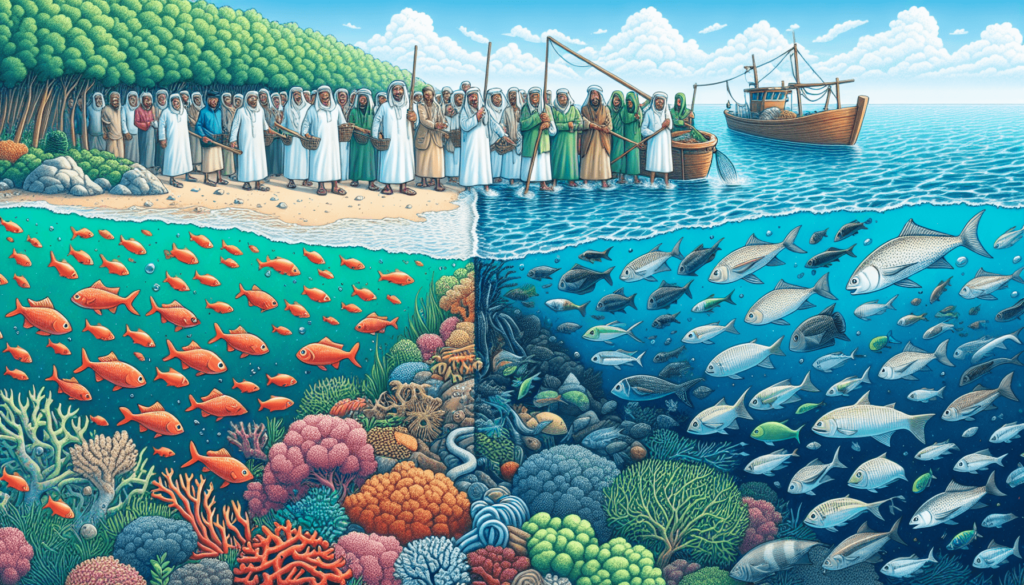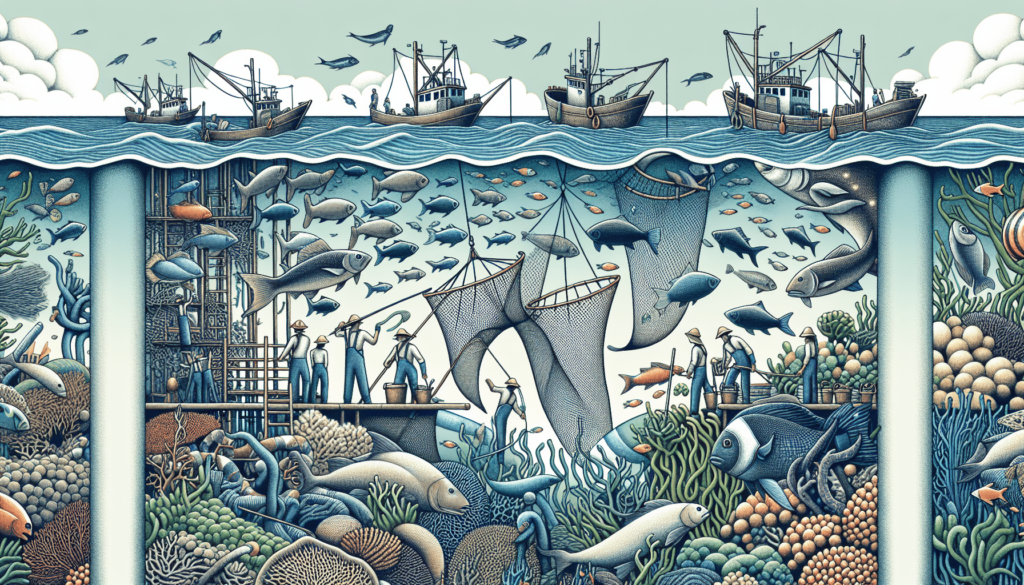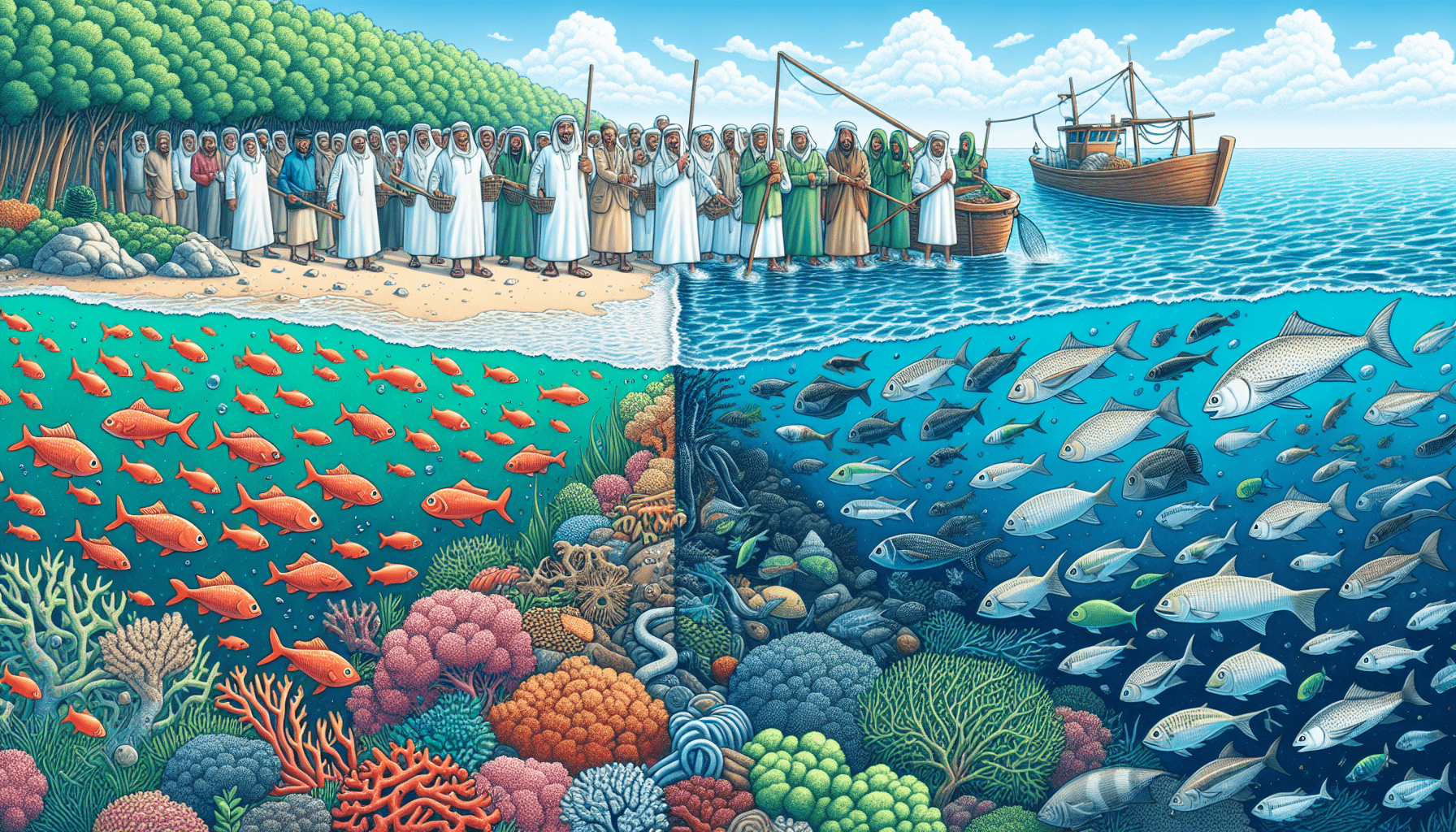Imagine a world where the oceans teem with life, where fish populations are abundant, and where coastal communities thrive. This world is not far-fetched; it is within our reach through sustainable fishing practices. By adopting responsible fishing methods that prioritize the long-term health of aquatic ecosystems, we can enjoy a plethora of benefits. From ensuring the survival of fish species and preserving biodiversity to supporting local economies and safeguarding food security, sustainable fishing practices offer a path towards a brighter, more sustainable future. So let’s explore the many advantages of embracing sustainable fishing and discover how we can make a positive difference for our oceans and ourselves.

Preserves Fish Populations
Prevents Overfishing
Sustainable fishing practices play a crucial role in preventing overfishing, which is the excessive removal of fish from a particular area. Overfishing can have devastating effects on fish populations, leading to decreased biodiversity and the collapse of entire ecosystems. By implementing sustainable fishing practices such as setting catch limits and using selective fishing methods, we can ensure that fish populations are protected and maintained at healthy levels.
Ensures Future Generations of Fish
By preserving fish populations through sustainable fishing practices, we also ensure the availability of fish for future generations. Without proper management and conservation efforts, many fish species are at risk of extinction or significant population decline. Sustainable fishing practices help to maintain the reproductive capacity of fish stocks, allowing them to replenish and sustain themselves, ultimately ensuring a continuous source of fish for the future.
Maintains Biodiversity
Biodiversity, the variety of species and ecosystems on our planet, is essential for the health and balance of our marine environments. Sustainable fishing practices contribute to the preservation of biodiversity by promoting the conservation of different fish species and their habitats. By preserving biodiversity, we can also safeguard the intricate web of relationships within marine ecosystems, ensuring the health and functionality of these complex systems.
Protects Marine Ecosystems
Preserves Coral Reefs
Coral reefs are among the most diverse and valuable ecosystems in the world, providing habitat for numerous fish species and supporting countless marine organisms. Sustainable fishing practices help to protect coral reefs by utilizing fishing methods that minimize damage to coral habitats and by avoiding overfishing in areas close to these fragile ecosystems. By safeguarding coral reefs, we can ensure the survival of countless species and maintain the beauty and integrity of these vital marine habitats.
Maintains Balanced Food Chains
Maintaining balanced food chains within marine ecosystems is crucial for the overall health and functioning of these environments. Sustainable fishing practices contribute to this balance by avoiding the depletion of key predator or prey species. Overfishing can disrupt the natural balance, leading to population imbalances and potential ecosystem collapse. By adopting sustainable practices, we can help to maintain the delicate equilibrium within marine food chains, ensuring the survival of various species and the overall health of the ecosystem.
Conserves Habitats
Sustainable fishing practices also play a critical role in conserving habitats essential for thriving marine ecosystems. By employing responsible fishing methods and gear, fishermen can avoid damaging sensitive habitats such as seagrass beds, mangroves, and oceanic reefs. These habitats serve as nurseries and feeding grounds for many important fish species and other marine organisms. By preserving these habitats, we provide a safe haven for marine life, support ecological diversity, and contribute to the overall health of our oceans.
Supports Local Communities
Creates Jobs
Sustainable fishing practices not only benefit the environment but also support local communities by creating employment opportunities. A well-managed and sustainable fishing industry requires a skilled workforce, ranging from fishermen to fishery managers, scientists, and conservationists. By promoting sustainable fishing practices, we can ensure the long-term viability of the fishing industry, leading to job creation and economic growth for coastal communities that heavily rely on fishing as a source of income.
Promotes Economic Stability
The implementation of sustainable fishing practices promotes economic stability in communities dependent on fishing. By avoiding overfishing and preserving fish populations, we enable the fishing industry to operate sustainably for the long term. Sustainable fishing practices ensure a consistent and reliable source of income for fishing communities, reducing dependence on unpredictable fish stocks and contributing to economic stability within these regions.
Preserves Cultural Heritage
Fishing has long been integral to the cultural heritage of coastal communities, shaping traditions, customs, and ways of life. Sustainable fishing practices help to preserve this cultural heritage by ensuring the availability of fish and the continuation of fishing traditions. By embracing sustainable practices, we can protect the livelihoods and cultural identities of fishing communities for generations to come.
Reduces Bycatch and Discards
Minimizes Unwanted Catch
Bycatch refers to the unintentional capture of non-target species during fishing operations. Unsustainable fishing practices often result in high levels of bycatch, leading to the unnecessary death and waste of marine life. Sustainable fishing practices aim to minimize unwanted catch through the use of selective fishing methods, such as employing gear modifications that reduce the capture of non-target species. By reducing bycatch, we minimize the negative impact on vulnerable species and promote the sustainable use of our marine resources.
Prevents Waste and Depletion
Bycatch often results in the discarding of unwanted catch back into the ocean, a practice that is not only wasteful but also contributes to the depletion of fish populations. Sustainable fishing practices aim to prevent waste and depletion by avoiding excessive bycatch and reducing the discard of unwanted catch. By employing responsible fishing methods and gear, we can ensure that only the target species are caught, minimizing waste and preserving the health and abundance of our fish populations.
Improves Sustainability
Reducing bycatch and discards is crucial for improving the overall sustainability of fishing practices. Sustainable fishing practices minimize the negative impact on marine ecosystems, leading to enhanced long-term sustainability. By adopting responsible and selective fishing methods, we can ensure that our fishing activities are environmentally friendly, economically viable, and socially responsible, contributing to the overall sustainability of our oceans.

Enhances Food Security
Provides Sustainable Protein Source
Sustainable fishing practices play a vital role in enhancing food security by providing a sustainable source of protein for human consumption. Fish is a valuable and nutritious food source, particularly for coastal communities and developing countries that heavily rely on seafood as a dietary staple. By promoting sustainable fishing practices, we ensure that future generations have access to this important protein source, contributing to global food security and addressing nutritional needs.
Reduces Reliance on Imports
Sustainable fishing practices also help to reduce reliance on imported seafood, enhancing food security at the national level. By managing fish stocks sustainably and promoting domestic fishing industries, countries can reduce their dependence on imported seafood, ensuring a consistent supply of fish for their populations. Reducing imports not only contributes to food security but also boosts local economies and reduces the carbon footprint associated with long-distance food transportation.
Supports Global Food Supply
The implementation of sustainable fishing practices is crucial for supporting the global food supply. Fish is a significant source of protein for millions of people worldwide, and ensuring its availability requires responsible and sustainable fishing practices. By managing fish populations sustainably and conserving marine ecosystems, we can continue to meet the growing demand for seafood while avoiding overexploitation, protecting fish populations, and supporting the long-term sustainability of the global food supply.
Mitigates Climate Change
Reduces Greenhouse Gas Emissions
Sustainable fishing practices can contribute to mitigating climate change by reducing greenhouse gas emissions. The fishing industry, particularly large-scale commercial fishing, can generate significant emissions through fuel consumption and by operating heavy-duty fishing vessels. By adopting more energy-efficient practices, optimizing vessel routes, and using cleaner fuels, we can reduce the carbon footprint of the fishing industry, helping to combat climate change.
Preserves Carbon Sinks
The health of our oceans plays a crucial role in the global carbon cycle, as they act as important carbon sinks, absorbing and storing large amounts of carbon dioxide from the atmosphere. Sustainable fishing practices contribute to the preservation of these carbon sinks by maintaining healthy marine ecosystems and promoting biodiversity. By safeguarding these ecosystems, we can ensure their continued ability to sequester carbon, helping to mitigate the impacts of climate change.
Maintains Oceanic Carbon Balance
The preservation of oceanic carbon balance is essential for mitigating climate change. Sustainable fishing practices contribute to maintaining this balance by avoiding the overexploitation of fish stocks and preventing disruptions in marine food chains. By allowing fish populations to thrive and supporting healthy marine ecosystems, we can ensure the efficient cycling of carbon within our oceans, contributing to the long-term stability of the climate.
Improves Fishing Practices
Promotes Selective Fishing Methods
Sustainable fishing practices promote the use of selective fishing methods that target specific fish species while minimizing the capture of non-target species. Selective fishing methods can include using different types of fishing gear, such as hooks and lines or traps, that are more species-specific and allow for the release of non-target species unharmed. By promoting selective fishing methods, we can reduce bycatch, enhance the sustainability of fishing practices, and minimize the impact on non-target species and marine ecosystems.
Encourages Responsible Fishing Gear
The adoption of responsible fishing gear is another key aspect of sustainable fishing practices. Responsible fishing gear design focuses on minimizing habitat damage, reducing bycatch, and ensuring sustainable fishing operations. For example, the use of modified fishing nets with escape panels allows smaller and non-target species to escape, reducing bycatch while maintaining the target catch. By encouraging the use of responsible fishing gear, we can minimize the negative impact on marine ecosystems and promote sustainable fishing practices.
Adopts Innovative Technologies
Innovation plays a crucial role in improving fishing practices and promoting sustainability. The development and adoption of innovative fishing technologies can help reduce the impact of fishing on marine habitats and ecosystems. For instance, the use of satellite technology and advanced monitoring systems allows for more accurate tracking of fishing vessels, enabling better management of fishing activities and reducing the likelihood of illegal, unreported, and unregulated (IUU) fishing practices. By embracing innovative technologies, we can enhance fishing practices, promote sustainability, and ensure the long-term viability of our oceans.
Enhances Market Value
Meets Consumer Demand for Sustainability
Consumers are increasingly seeking sustainable seafood options, driven by concerns about the environment and a desire to make ethical choices. Sustainable fishing practices allow fisheries to meet this growing demand for sustainable seafood, enhancing the market value of their products. By adopting and promoting sustainable fishing practices, fishermen and fishery managers can tap into this market, attract environmentally conscious consumers, and contribute to the economic viability of their operations.
Promotes Eco-certified Products
Eco-certifications, such as the Marine Stewardship Council (MSC) and Aquaculture Stewardship Council (ASC) certifications, provide consumers with confidence that the seafood they are purchasing comes from sustainable sources and has been responsibly harvested or farmed. By adhering to sustainable fishing practices, fishermen can qualify for these eco-certifications, enhancing the market value of their products and gaining a competitive edge in the marketplace. The promotion and consumption of eco-certified products further incentivize sustainable fishing practices and contribute to the overall sustainability of the fishing industry.
Attracts Price Premiums
Sustainable seafood products often command higher prices in the marketplace due to the increased demand from environmentally conscious consumers. By embracing sustainable fishing practices, fishermen can position themselves as suppliers of high-quality, responsibly sourced seafood, attracting price premiums and generating higher revenues for their catch. The economic benefits associated with sustainable fishing practices not only support the livelihoods of fishermen but also incentivize the adoption of sustainable practices throughout the fishing industry.
Maintains Livelihoods
Sustains Fishing Communities
Sustainable fishing practices are vital for the sustainability of fishing communities worldwide. By preserving fish populations, avoiding overexploitation, and maintaining healthy marine ecosystems, we can ensure the continuity of fishing as a viable livelihood for those dependent on it. The sustainability of fishing communities relies on the availability of fish stocks, and sustainable fishing practices play a critical role in supporting the long-term viability of these communities.
Supports Small-scale Fishers
Small-scale fishers often operate in close harmony with their natural environment and rely on sustainable fishing practices to sustain their livelihoods. By promoting responsible fishing methods, conserving fish populations, and reducing bycatch, we can support small-scale fishers and help them maintain their way of life. Sustainable fishing practices enable small-scale fishers to continue providing for their families while minimizing their impact on marine ecosystems and preserving their traditional fishing methods.
Preserves Fishing Traditions
Fishing traditions and cultural heritage are deeply intertwined with the practices and livelihoods of fishing communities. Sustainable fishing practices help to preserve these traditions by ensuring the availability of fish and the continuation of responsible fishing methods. By adopting sustainable fishing practices, we can support the preservation of fishing traditions, cultural identities, and the rich heritage associated with fishing communities around the world.
Promotes Collaboration and Governance
Facilitates International Cooperation
The global nature of the fishing industry requires international cooperation to effectively manage and conserve fish stocks and marine ecosystems. Sustainable fishing practices promote collaboration among nations, encouraging the sharing of data, best practices, and resources to improve fisheries management on a global scale. By fostering international cooperation, we can work towards a sustainable and equitable management of our oceans, ensuring the long-term conservation of fish populations and the health of marine ecosystems.
Adopts Effective Policy Frameworks
The adoption of effective policy frameworks is crucial for the successful implementation of sustainable fishing practices. Governments and fishery management organizations play a key role in developing and enforcing regulations that support sustainable fishing practices and protect fish populations. These policy frameworks often involve setting catch limits, implementing surveillance systems, and promoting responsible fishing behaviors. By adopting and implementing effective policy frameworks, we can ensure the enforcement of sustainable fishing practices and the conservation of our marine resources.
Monitors and Regulates Fishing Activities
Monitoring and regulating fishing activities are essential components of sustainable fishing practices. By monitoring fishing activities through measures such as vessel monitoring systems and observer programs, we can detect and deter illegal, unreported, and unregulated (IUU) fishing practices. Effective regulation of fishing activities ensures compliance with sustainable fishing practices, protects fish populations, and maintains the health and integrity of marine ecosystems. Through proper monitoring and regulation, we can safeguard our oceans and promote sustainable fishing practices.

